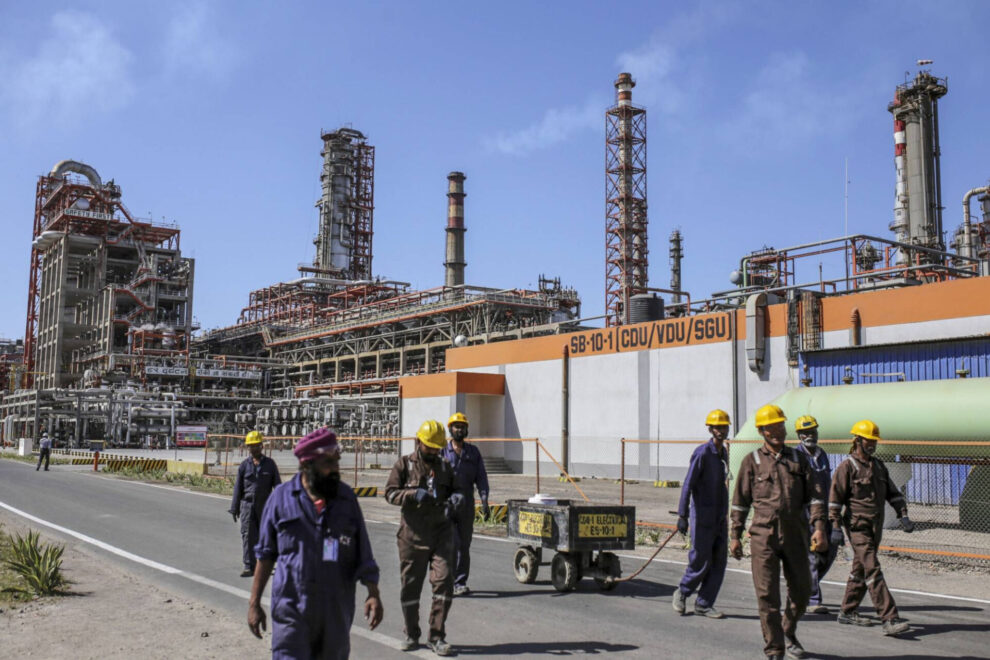With Russia cut off from the European market, North African countries have stepped forward to become voracious buyers of its diesel and other refined oil products.
The rise in trade has offered a lifeline of sorts for Moscow, providing a healthy new revenue stream, but also raised concerns about whether it is undermining Western efforts to remove Russian fossil fuels from their economies.
Catch up on the headlines, understand the news and make better decisions, free in your inbox every day.PreviewSubscribe
European nations, which before the war accounted for around 60% of Russian refined oil-product exports, have curtailed those flows in recent months. A European Union ban on imports of Russian refined oil products—which includes diesel and gasoline among others—came into force this month alongside measures to cap the price Russia earns on sales elsewhere. Those measures follow similar sanctions on Russian crude oil imports in December.
The sanctions have largely worked as intended, The Wall Street Journal reported on Thursday, but have forced Moscow to redirect exports away from Europe to alternative markets.
North African countries picked up the slack.
Morocco’s imports of Russian diesel, which stood at around 600,000 barrels for the whole of 2021, surged to 2 million barrels in January, with at least a further 1.2 million barrels expected to arrive in the country in February, according to data from Kpler. Algeria and Egypt have also seen an uptick.
Tunisia, which similarly imported almost no Russian oil products in 2021, has in recent months been devouring Russian supplies of diesel, gasoil, gasoline and naphtha—which is commonly used to make chemicals and plastics. The country took 2.8 million barrels of Russian oil products in January and is expected to import another 3.1 million barrels this month.
The increased imports to Tunisia and Morocco coincided with an uptick in their own refined-product exports, raising concerns that Russian cargoes were being blended with other oil products and re-exported. That process disguises the ultimate origin of the products and complicates Western efforts to remove Russian fossil fuels from their economies.
“Even if you wanted to regulate that, how would you?” said Andreas Economou, head of oil research at The Oxford Institute for Energy Studies. “If a cargo is 51% from Morocco, 49% from Russia, how would you referee that?”
The shipments occurred before Feb. 5, when the latest round of sanctions on trading became effective, so there were no laws against re-exporting Russian oil products at the time. Still, they point to the headache that European nations face in trying to keep their imports free of Russian diesel and other oil products.
If the trend continues, it could also hurt the West’s goal to deprive Moscow of income for its war in Ukraine, analysts say.
The quantities North African countries are importing are too much for them to take on their own, said Viktor Katona, senior oil analyst at Kpler, who expects some of the Russian products to make their way back to Europe. “Trust me, we are not witnessing some renaissance in Maghrebi refining,” he said, referring to the region of North Africa.

Morocco, which has no previous record of any significant diesel exports, last month shipped a 280,000-barrel cargo of diesel to Spain’s Canary Islands and another 270,000-barrel cargo to Turkey which coincided with the influx of Russian diesel to Morocco. The ultimate origin of those diesel cargoes couldn’t be determined.
The oil ministries for Morocco and Tunisia didn’t respond to requests for comment.
Earlier this month, just after the new sanctions went into effect, Spain said it had turned away a Maersk Tankers A/S-controlled vessel from its port of Tarragona as it believed its cargo of diesel, some of which was loaded via a ship-to-ship transfer in the Mediterranean, originally came from Russia.
Maersk Tankers said it had conducted a full sanctions check on the diesel and documentation showed it was from Turkey.
For Russia, ports in North Africa provide an ideal destination to dump cargoes of diesel and other products which have been shunned by their typical buyers in the West. For Russian ships sailing from the Baltic Sea, voyages to North Africa are relatively short and not much longer than their prewar trips to European ports. This allows Russia to keep shipping costs low and prevents its limited fleet of tankers from getting tied up in lengthy voyages to Asia or elsewhere.
The rise in Russian oil product exports to these countries is also providing Russia with a fresh revenue stream. China and India, which have become the biggest buyers of its crude oil, have shown less interest in its refined products, forcing it to look elsewhere for buyers of diesel and other products.

It is unclear how much the surge in imports to North Africa would be re-exported and how much was simply buyers looking for a cheaper source of diesel and other commonly used fuels, said Jorge Leon, senior vice president at Rystad Energy.
Some of North Africa’s increased diesel imports from Russia have displaced the region’s typical suppliers in the Middle East and North America, suggesting some of the activity was bargain hunting, Mr. Leon said.
Russia’s refined-product exports held steady in January—despite the impending EU import ban—as it found new buyers, particularly in Africa, while Moscow’s total energy export revenues also inched higher to $13 billion, according to the International Energy Agency.
It was unclear whether the flows would continue in the coming months, analysts said, as the price cap measures will make it harder to move Russian oil products around the world. A key unknown is how strict European states will be in enforcing their own rules particularly as they look for new sources to replace lost Russian supplies.
“I am not sure the Westerners care so much,” said Mr. Economou. “For them, to have Russian flows keep flowing is win-win. I don’t think anybody is going to ask where it comes from when the market is this tight.”
Source : WallStreetJournal
















